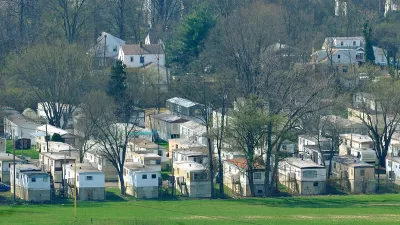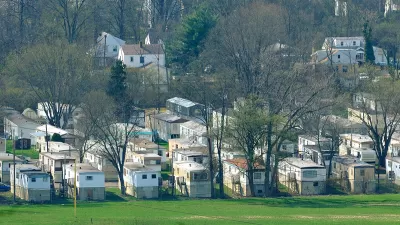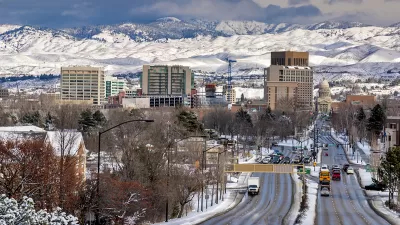An examination of the common trailer park reveals a few key lessons about land use, urban design, and private governance.

"Trailer parks remain one of the last forms of housing in US cities provided by the market explicitly for low-income residents," writes Nolan Gray. "Better still, they offer a working example of traditional urban design elements and private governance."
According to Gray, trailer parks are an outlier in the U.S. real estate market. But there very existence offers a lot of instruction about how land use regulation and market forces work. Gray writes: "where they exist, [trailer parks] are often subject to uniquely liberal land-use regulation, with minimal setbacks, fewer parking requirements, and tiny minimum lot sizes. The result is that many trailer parks have relatively high population densities.
There's more:
By combining these liberal land-use regulations with narrow streets shared by all users, we ironically find in many trailer parks a kind of traditional urban design more common in European and Japanese cities. With functional urban densities and traditional urban design, the only thing missing in most trailer parks is a natural mixture of commercial and industrial uses.
Gray concludes the article by proposing three key lessons to be learned from trailer parks.
FULL STORY: RECLAIMING "REDNECK" URBANISM: WHAT URBAN PLANNERS CAN LEARN FROM TRAILER PARKS

Planetizen Federal Action Tracker
A weekly monitor of how Trump’s orders and actions are impacting planners and planning in America.

Maui's Vacation Rental Debate Turns Ugly
Verbal attacks, misinformation campaigns and fistfights plague a high-stakes debate to convert thousands of vacation rentals into long-term housing.

Restaurant Patios Were a Pandemic Win — Why Were They so Hard to Keep?
Social distancing requirements and changes in travel patterns prompted cities to pilot new uses for street and sidewalk space. Then it got complicated.

In California Battle of Housing vs. Environment, Housing Just Won
A new state law significantly limits the power of CEQA, an environmental review law that served as a powerful tool for blocking new development.

Boulder Eliminates Parking Minimums Citywide
Officials estimate the cost of building a single underground parking space at up to $100,000.

Orange County, Florida Adopts Largest US “Sprawl Repair” Code
The ‘Orange Code’ seeks to rectify decades of sprawl-inducing, car-oriented development.
Urban Design for Planners 1: Software Tools
This six-course series explores essential urban design concepts using open source software and equips planners with the tools they need to participate fully in the urban design process.
Planning for Universal Design
Learn the tools for implementing Universal Design in planning regulations.
Heyer Gruel & Associates PA
JM Goldson LLC
Custer County Colorado
City of Camden Redevelopment Agency
City of Astoria
Transportation Research & Education Center (TREC) at Portland State University
Jefferson Parish Government
Camden Redevelopment Agency
City of Claremont





























